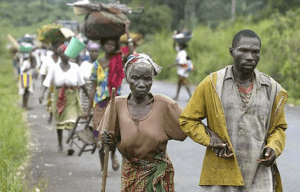Ganta, Nimba County – The heat of late morning sun here is overwhelming today. Dorbor Kullie [name withheld to protect him from stigma] moves his chair by the side of a building to benefit from its shade. He uses his shirt to wipe his face but he continues to sweat. Yet, he wears a winter hat with ear-flaps. The ear-flaps do more than just cover his ears, they are cover the spots where his ears used to be.

It is 25 years since Kullie and his brother, then young teenagers, were dragged out of their refuge hut and tortured. United Liberation Movement of Liberia for Democracy (ULIMO K) cut open his brother’s chest with a knife while he was alive and ripped out his heart. Yet, in some ways Kullie feels his brother is the luckier of the two. He does not have to relive the aftermath of the of the despicable crime.
“First, they cut off one of my ears, they gave it to me and asked me to chew it,” Kullie recalls. “I was chewing until I noticed they were not paying attention to me, then I dropped it. They came back and cut my other ear. It was so painful I could not cry. I knew I was going to die.”
The physical scars may have healed but Kullie, now 37, keeps seeing flashbacks of his brother being killed, and his own torture, when he was just 12 years old.
Kullie is one of thousands of Liberians who are still suffering as a result of shocking things that happened to them or what they saw happen to others during the war in Liberia. There are no recent statistics available but a 2008 study conducted five years after Liberia’s civil war ended by Harvard Humanitarian Initiative at Harvard University, found that 40% of Liberians had symptoms of major depression and 44% appeared to have post-traumatic stress disorder.
There have been discussions in the public about other issues related to war crimes in Liberia. But the country’s mental health problems have never been a part of the public discourse. The war is to blame for many of Liberia’s mental health conditions says Dr. Janice Cooper, head of Carter Center Mental Health programs in Liberia from 2010 to 2018.
“When we think about what the vestiges of the war is in terms of mental illness, we think about the fact that people suffered trauma, severe trauma,” says Dr. Cooper. “It is not just what they saw and witnessed that led them to be post traumatic. People had their heads hit with the butt of guns. They were beaten to a degree that was terrible, all of those things.”
The impacts of post-traumatic stress disorder are far reaching. People who lived during the war in Liberia are not the only ones that are suffering. Younger generations suffer too, says Dr. Cooper.
“When we think about the war and mental health, we need to think about the legacy of the war,” says Cooper. We have generations now that did not know war but they also experienced trauma and other mental health conditions as a result of the war. They are legacy of the war in that they may have a mother or father that has mental illness and so they experience it. Or, they may have a life situation because of that.”
Kullie’s family has suffered because of his trauma. At this time of the day, most Liberian parents have gone to work but Kullie is at home. He bends his head fighting back tears, unable to forget what happened to him and his brother in Luyama town in Lofa County in 1993.
“I am finding it hard to find job. Every time I apply for a job when they call me and I appear, I will not hear from them again,” he says. “Because of my ears I feel stigmatized. My daughter does not live with me. She lives with my wife brother in Monrovia. It makes me feel so bad to not be able to take care of her.”
There is only one mental health facility in Liberia-E.S. Grant run by the John F. Kennedy Hospital on Duport Road. With his distance and condition, the only help Kullie has been able to get is by radio. “I listen to Aaron Debah’s program it makes me feel better. I would like to work with him.”
Aaron Debah, a mental health clinician who teaches at the United Methodist University nursing school in Ganta and runs a local program using the radio to help people with mental health conditions. He says he believes that there are many people who are afraid to visit the clinic/hospital.
“We know that there are a lot of people in our communities in Nimba who were affected because a whole lot happened here [during the war],” he says. “That is why we do home visitations and awareness creation by the radio. There are stigma and other [Spiritual] beliefs associated with mental health conditions. Herbalists and other religious [Pastor and Imams] people have convinced our people.”
Kullie looks at the other scars on his arms -remnants of a cruel form of torture in which the elbows are tied on the back so thoroughly that the rope cuts into the flesh. This was commonly referred to as ‘duck farh tarbay’.
“I believe they wanted body parts from us for ritual. I decided they will not get it while I was alive. I decided to run believing they will shoot me in the back. I ran and that was how I survived. I came back that night and saw that they took my brother’s heart.”
This story first appeared on FrontPageAfricaOnline as part of a collaboration for the West Africa Justice Reporting Project.
